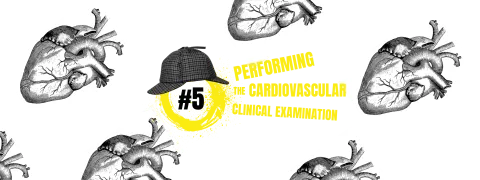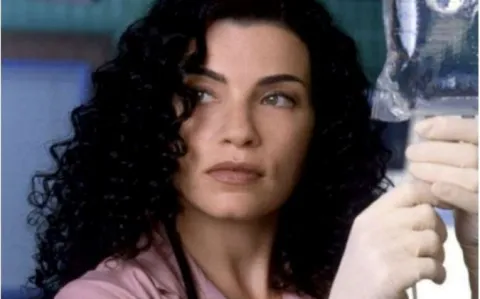
A patient referred to the internal medicine department…
Dr Wolf: Sit down, Ms Carter. So, you’ve been sent up from the A&E Department. Could you tell me what prompted your visit to the emergency department?
Rose Carter: Well, I’ve had this pain in my chest for the last couple of days. I called the NHS 111 service and they told me to come to the hospital.
Dr Wolf: I see – a wise decision – Can you describe the pain for me?
Rose Carter: It’s like a dull ache and it’s there all the time. And it’s difficult for me to breathe.
Dr Wolf: Does the pain spread at all – to your shoulder or arm, for example.
Rose Carter: No, not at all – it’s just in my chest.
Dr Wolf: Tell me, Ms Carter, have you travelled abroad recently?
Rose Carter: Well, in fact, yes – I’ve just come back from a holiday in the Philippines – we had a lovely time.
Dr Wolf: And your problems started when you got back?
Rose Carter: Yes, that’s right.
Dr Wolf: Did you notice any swelling in your legs when you got off the plane?
Rose Carter: No, nothing like that, but my face was a bit red, especially my nose and cheekbones, probably a bit of sunburn.
Dr Wolf: Tell me, do you ever have any pain or stiffness in your joints, in your hands, for example?
Rose Carter: Well, now you mention it, yes, my hands are a bit stiff in the morning.
Dr Wolf: And what about in cold weather, do your fingers tend to become white or blue and then red and painful?
Rose Carter: Yes, they do. I thought it was just poor circulation.
Dr Wolf: Right, Ms Carter, we’ll have to do some more tests. I’ll send you down for a chest X-ray in a few minutes, but first, I’d like to examine you.
Rose Carter: OK.
Dr Wolf: Well your vital signs are OK. There’s no swelling or redness in your legs. Could you take off your top things, I’d like to listen to your chest?
Rose Carter: Yes, of course.
Dr Wolf: Hmm – your heart sounds are a bit muffled; there seems to be some liquid in your chest. I think you’d better go down for your chest X-ray now and we’ll do some blood tests.
Rose Carter: Oh dear – is it serious, Doctor?
Dr Wolf: I think you may have systemic lupus erythematous, SLE, for short, but I’ll know for sure when I’ve got the results of the tests.
(…)
Dr Wolf: Come in, Ms Carter; sit down.
Rose Carter: Thank you.
Dr Wolf: We have the results of the tests and it is indeed lupus, I’m afraid. It’s an autoimmune disease and there is no cure for the moment, but there are treatments available that control the disease well and certain recommendations that you need to follow.
Rose Carter: Oh dear – What do I have to do?
Dr Wolf: This illness mostly affects women between 20 and 40, and people with lupus experience flare-ups, which may last for several weeks, and then disappear for months or even years. You have to be very careful with exposure to the sun because this often triggers flare-ups. The rash that you had on your face after your holiday was typical of lupus – it’s called a butterfly rash. Hormones may also be a factor, so it would be advisable to avoid taking the pill or change to progestin-only contraception.
Rose Carter: What about the treatment?
Dr Wolf: We usually prescribe corticosteroids to control inflammation if it becomes severe, and hydroxychloroquine, which can provide relief for certain symptoms. We’ll need to do some other tests too to check your kidney function and to see if your nervous system is affected. Just one more question. Are you thinking of starting a family?
Rose Carter: Not yet, but we have spoken about it. Is there a problem?
Dr Wolf: Well, it’s very strongly advised to make sure the lupus is under control before you become pregnant, because otherwise, there is a high risk of miscarriage. But if you’re followed closely, there’s no reason why you shouldn’t have children…
________________________________________________________________
Find in the text a word or expression (in bold) equivalent to the words or expressions below:
- Accident and Emergency (GB)
- articulations
- attacks, crises
- carefully
- carrying a baby
- causes, starts off
- continuous, not sharp pain
- diminished, reduced
- ease, alleviate
- if not
- in the abbreviated form
- left
- malar rash
- motivated
- oedema
- persist
- radiate
- recommended
- renal function
- rigidity
- sensible, reasonable, intelligent
- spontaneous abortion
- strip to the waist
- thorax
- to a foreign country
- zygomatic bones
________________________________________________________________
- Accident and Emergency (GB) = A&E
- articulations = joints
- attacks, crises = flare-ups
- carefully = closely
- carrying a baby = pregnant
- causes, starts off = triggers
- continuous, not sharp pain = dull ache
- diminished, reduced = muffled
- ease, alleviate = provide relief for
- if not = otherwise
- in the abbreviated form = for short
- left = got off
- malar rash = butterfly rash
- motivated = prompted
- oedema = swelling
- persist = last
- radiate = spread
Source:
*Professeurs d’anglais médical `a l’université de Dijon













